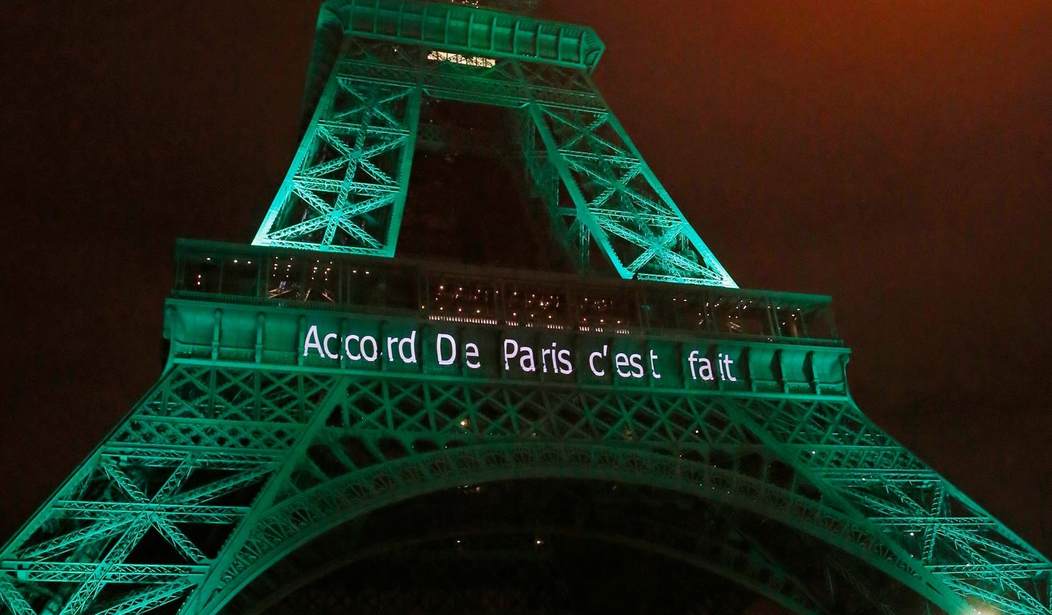On September 3, 2016, then-President Barack Obama engaged the United States in the Paris climate agreement.
He called it the “most ambitious climate change agreement in history.”
That means Obama considered it more ambitious than the Framework Convention on Climate Change—a treaty the Senate approved October 7, 1992.
It means he considered it more ambitious than the Kyoto Protocol, American engagement in which the Senate killed with S.Res.98, passed by a roll-call vote of 95-0 on July 25, 1997.
That resolution stated:
… the United States should not be a signatory to any protocol to, or other agreement regarding, the United Nations Framework Convention on Climate Change of 1992, … which would—(A) mandate new commitments to limit or reduce greenhouse gas emissions …, unless the protocol or other agreement also mandates new specific scheduled commitments to limit or reduce greenhouse gas emissions for Developing Country Parties within the same compliance period, or (B) would result in serious harm to the economy of the United States.
Nonetheless, President Obama engaged us in the Paris agreement by the mere stroke of his pen. He did not follow Article II Section 2 of the Constitution, which empowers a President “to make Treaties, provided two thirds of the Senators present concur.”
Why? Because he decided it wasn’t a treaty. It was a mere executive agreement.
Despite the fact that pretty much every other country in the world called it a treaty. Despite the fact that it would “result in serious harm to the economy of the United States” by committing the country to spend scores of trillions of dollars through the rest of this century. And despite the fact that it committed Congress to act in accord with its provisions for at least the next three decades.
Recommended
Clearly, if the Framework Convention and the Kyoto Protocol required Senate approval—the former getting it, the latter not—this “most ambitious climate change agreement in history” should have required Senate approval.
Nonetheless, Obama did what he did.
But on June 1, 2017, President Donald Trump announced that the United States would withdraw from the agreement. Following the rules of the agreement, the withdrawal process took over three years, culminating on November 4, 2020—the day after the Presidential election.
Trump could have announced that he disagreed with Obama and considered the Paris agreement a treaty, which implied that Obama had engaged us in it contrary to the Constitution, and that therefore the United States had never legally been a party to it. That would have ended our participation immediately. It would also have made it much more difficult for a successor to follow Obama’s lead and re-engage by mere executive agreement.
Why Trump didn’t do that has been debated. Set that aside for now.
What’s clear is that former Vice President Joe Biden intends—assuming he’s inaugurated on January 20—to do as Obama did. “Today, the Trump Administration officially left the Paris Climate Agreement. And in exactly 77 days, a Biden Administration will rejoin it,” he Tweeted the day after the election.
So, we’ll be “back in Paris.”
Or maybe not.
Trump can still play a trump card that could spoil Biden’s dream.
He could submit the Paris agreement to the Senate, state that in his opinion it is a treaty and should have been submitted in the first place, and ask the Senate to fulfill its duty of advice and consent by deciding whether it is a treaty and, if so, voting whether to ratify it.
With Republicans still in control of the Senate at least until January 6 (the day after Georgia’s runoff elections to determine its two Senate seats), the Senate could readily determine that it is a treaty. And the chance that it would ratify—by the necessary two-thirds vote—is essentially zero. And even if it did, that wouldn’t require Trump to sign it on behalf of the country.
Would that legally prohibit Biden from re-engaging in it by declaring it not a treaty by an executive agreement? Good question—it probably would be litigated.
But it would make it politically much more difficult for Biden to do it. The Senate, precisely because it has two members from each state, each of whom represents the whole state, much better expresses the will of the American people as a whole than the House, in which each member represents not a whole state but only a district.
President Trump is known as the disrupter. Let him disrupt again.
E. Calvin Beisner, Ph.D. is Founder and National Spokesman of The Cornwall Alliance for the Stewardship of Creation.

























Join the conversation as a VIP Member